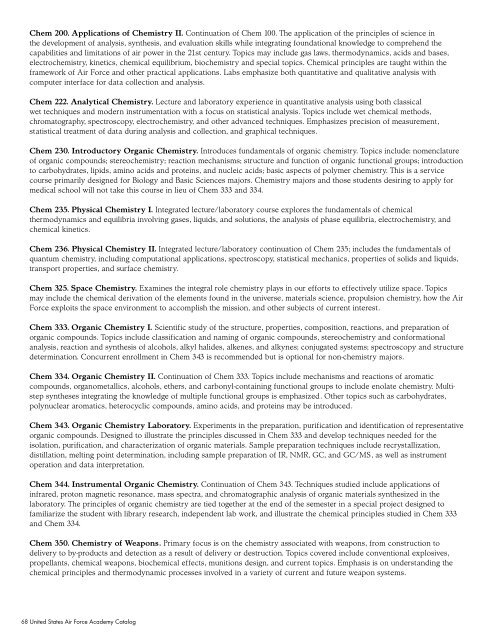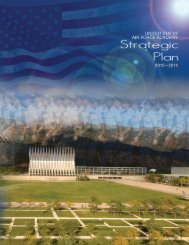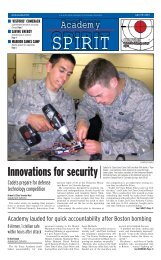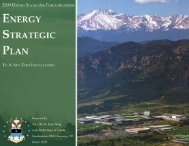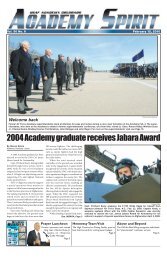2008-2009 Catalog - United States Air Force Academy
2008-2009 Catalog - United States Air Force Academy
2008-2009 Catalog - United States Air Force Academy
You also want an ePaper? Increase the reach of your titles
YUMPU automatically turns print PDFs into web optimized ePapers that Google loves.
Chem 200. Applications of Chemistry II. Continuation of Chem 100. The application of the principles of science in<br />
the development of analysis, synthesis, and evaluation skills while integrating foundational knowledge to comprehend the<br />
capabilities and limitations of air power in the 21st century. Topics may include gas laws, thermodynamics, acids and bases,<br />
electrochemistry, kinetics, chemical equilibrium, biochemistry and special topics. Chemical principles are taught within the<br />
framework of <strong>Air</strong> <strong>Force</strong> and other practical applications. Labs emphasize both quantitative and qualitative analysis with<br />
computer interface for data collection and analysis.<br />
Chem 222. Analytical Chemistry. Lecture and laboratory experience in quantitative analysis using both classical<br />
wet techniques and modern instrumentation with a focus on statistical analysis. Topics include wet chemical methods,<br />
chromatography, spectroscopy, electrochemistry, and other advanced techniques. Emphasizes precision of measurement,<br />
statistical treatment of data during analysis and collection, and graphical techniques.<br />
Chem 230. Introductory Organic Chemistry. Introduces fundamentals of organic chemistry. Topics include: nomenclature<br />
of organic compounds; stereochemistry; reaction mechanisms; structure and function of organic functional groups; introduction<br />
to carbohydrates, lipids, amino acids and proteins, and nucleic acids; basic aspects of polymer chemistry. This is a service<br />
course primarily designed for Biology and Basic Sciences majors. Chemistry majors and those students desiring to apply for<br />
medical school will not take this course in lieu of Chem 333 and 334.<br />
Chem 235. Physical Chemistry I. Integrated lecture/laboratory course explores the fundamentals of chemical<br />
thermodynamics and equilibria involving gases, liquids, and solutions, the analysis of phase equilibria, electrochemistry, and<br />
chemical kinetics.<br />
Chem 236. Physical Chemistry II. Integrated lecture/laboratory continuation of Chem 235; includes the fundamentals of<br />
quantum chemistry, including computational applications, spectroscopy, statistical mechanics, properties of solids and liquids,<br />
transport properties, and surface chemistry.<br />
Chem 325. Space Chemistry. Examines the integral role chemistry plays in our efforts to effectively utilize space. Topics<br />
may include the chemical derivation of the elements found in the universe, materials science, propulsion chemistry, how the <strong>Air</strong><br />
<strong>Force</strong> exploits the space environment to accomplish the mission, and other subjects of current interest.<br />
Chem 333. Organic Chemistry I. Scientific study of the structure, properties, composition, reactions, and preparation of<br />
organic compounds. Topics include classification and naming of organic compounds, stereochemistry and conformational<br />
analysis, reaction and synthesis of alcohols, alkyl halides, alkenes, and alkynes; conjugated systems; spectroscopy and structure<br />
determination. Concurrent enrollment in Chem 343 is recommended but is optional for non-chemistry majors.<br />
Chem 334. Organic Chemistry II. Continuation of Chem 333. Topics include mechanisms and reactions of aromatic<br />
compounds, organometallics, alcohols, ethers, and carbonyl-containing functional groups to include enolate chemistry. Multistep<br />
syntheses integrating the knowledge of multiple functional groups is emphasized. Other topics such as carbohydrates,<br />
polynuclear aromatics, heterocyclic compounds, amino acids, and proteins may be introduced.<br />
Chem 343. Organic Chemistry Laboratory. Experiments in the preparation, purification and identification of representative<br />
organic compounds. Designed to illustrate the principles discussed in Chem 333 and develop techniques needed for the<br />
isolation, purification, and characterization of organic materials. Sample preparation techniques include recrystallization,<br />
distillation, melting point determination, including sample preparation of IR, NMR, GC, and GC/MS, as well as instrument<br />
operation and data interpretation.<br />
Chem 344. Instrumental Organic Chemistry. Continuation of Chem 343. Techniques studied include applications of<br />
infrared, proton magnetic resonance, mass spectra, and chromatographic analysis of organic materials synthesized in the<br />
laboratory. The principles of organic chemistry are tied together at the end of the semester in a special project designed to<br />
familiarize the student with library research, independent lab work, and illustrate the chemical principles studied in Chem 333<br />
and Chem 334.<br />
Chem 350. Chemistry of Weapons. Primary focus is on the chemistry associated with weapons, from construction to<br />
delivery to by-products and detection as a result of delivery or destruction. Topics covered include conventional explosives,<br />
propellants, chemical weapons, biochemical effects, munitions design, and current topics. Emphasis is on understanding the<br />
chemical principles and thermodynamic processes involved in a variety of current and future weapon systems.<br />
68 <strong>United</strong> <strong>States</strong> <strong>Air</strong> <strong>Force</strong> <strong>Academy</strong> <strong>Catalog</strong>


